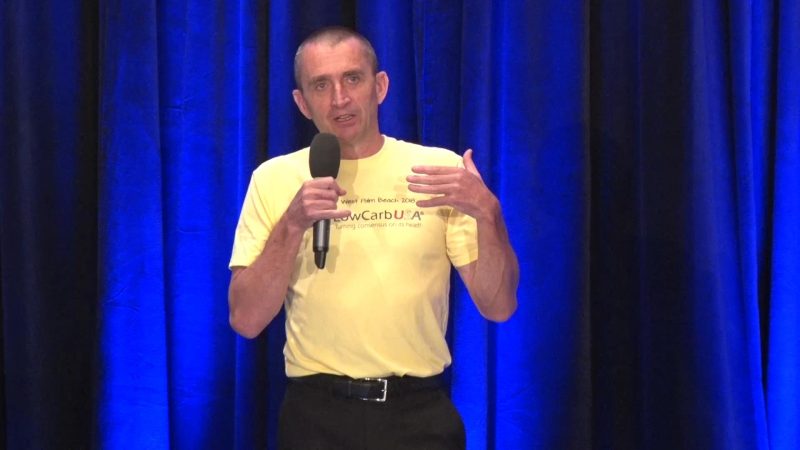Doug Reynolds was in his early thirties, regularly running marathons and ultra-marathons and eating almost anything he liked.
Then, everything changed.
Doug was putting on weight, training hard but not getting the results he wanted. That’s when he discovered the concepts that inspired him to found Low Carb USA.
“I was introduced to the concept of carbohydrate restriction and the ketogenic diet in 2015, and after researching it thoroughly and seeing that it explained all the issues of insulin resistance that I was developing as I grew older, I decided to pull the trigger and try it,” Doug said.
He started seeing results in just six months. He lost weight. He started breathing better. He was thinking clearer. His joints felt better. He became determined to tell others about what he discovered for himself: that the ketogenic diet results in metabolic changes by way of reduced carbohydrate consumption.
Low Carb USA set out to be something more than just a diet with empty promises and unsustainable practices. It’s about a lifestyle change that helps people make meaningful, lasting change in their life to affect how they feel.
Plus, a reduced-carbohydrate lifestyle doesn’t just make you feel better. It also helps prevent disease.
Doug Reynolds examined research and found an answer to what was holding him back. His journey to start Low Carb USA has encouraged and guided others, and his own experiences can shape the advice he offers. And for what he hasn’t experienced on his own, Doug has drawn on the experiences of others.
Next, Doug and Low Carb USA will travel around the world to describe the benefits of a ketogenic lifestyle to others, and how it can be executed. He recently spoke to Totalprestige Magazine about LowCarbUSA and the ketogenic lifestyle.
Doug, you founded LowCarbUSA in 2016. What inspired you to start the company and how has it grown in almost three years?
I can, and probably will, write a book about this. I was introduced to the concept of carbohydrate restriction and the ketogenic diet in 2015 and, after researching it thoroughly and seeing that it explained all the issues of insulin resistance that I was developing as I grew older, I decided to pull the trigger and try it. In six months, I experienced astounding results. My weight reverted to that of my 30s, my respiratory issues went away, I was thinking clearer than ever before and the inflammation in my knees that was making me feel really old, cleared up. I was astonished that I had never been privy to this information in my 50-odd years of life to that point. The science clearly shows that carbohydrate restriction as a therapeutic intervention not only results in great general health but addresses and even prevents many, if not all, chronic diseases. But due to financial and political and food industry influences, few people actually know about it. I became determined to find a way to get this information out there and help more people learn about the benefits I had experienced for myself.
The company’s ethos is based around the ketogenic diet. Can you explain how this diet works?
The ketogenic diet really means that the consumption of carbohydrates is reduced to a level that results in profound metabolic changes in the body. This state is known as ketosis and it is the point at which the body has switched from burning glucose (sugar and carbs) as the primary source of fuel to burning fat. It becomes more efficient at oxidizing fat directly at the cellular level to produce energy, but it also enables the release of free fatty acids from the fat cells to be processed in the liver to produce ketone bodies. These ketone bodies can be metabolized in the cells to produce energy and are, in fact, a preferred source of energy for most of the brain. Hence the plethora of reports from people who have adopted this lifestyle of improved brain function. It is not a calorie restricted diet, however. The calorie deficit is offset by consuming healthier fats. For the average person, restricting carbohydrates below 50 grams a day is usually sufficiently low for them to achieve ketosis. It may require less in some cases and, if a disease such as Type 2 Diabetes is in involved, it often needs to be less than 25 grams. This is an enormous conversation and there is a ton of information on our website at LowCarbUSA.org.
You have run hundreds of marathons and ultramarathons in your lifetime. How difficult was it for you to change to a low-carb/no-carb lifestyle in your 40s?
I was actually 51 when I first adopted this lifestyle. I grew up under the belief that to perform at your best in sports, especially endurance sports, you had to eat a lot of carbs and keep consuming them while racing. I have come to realise that this is totally false. There is a legendary sports physiologist and scientist, Professor Tim Noakes, who built his reputation on perfecting the concept of carbohydrate consumption during racing and training in his running bible called “The Lore of Running”. He was also the co-creator of the very first ‘Gu’ or replacement gel for racing called ‘FRN’ (Fordyce, Rose, Noakes). He recently made a video of himself tearing the pages out of his book and saying that he had been totally wrong, and he is committed to spending the rest of his days putting that right. He is currently busy writing a new revision of his book. Once I understood the science I totally believed in what I was trying to do, so I did not struggle with it at all. All the amazing flavours were streaming back into my life now that I was ‘allowed’ to eat fat again and I never looked back, not even once. I do realise that certain people are very seriously addicted to sugar and, for them, it is a huge struggle but there is a lot of help out there and if you understand your reasons for doing this (your WHY) then you have the strength to resist.
What are the benefits of living a low-carb/no-carb lifestyle?
It is becoming clear that the consumption of a high carbohydrate diet results in numerous insulin spikes throughout the day and this leads to the development of a condition called insulin resistance which, together with the highly inflammatory nature of a high carb diet, is the root of all evil. Almost all chronic conditions, including Morbid Obesity, Type 2 Diabetes, Cardiovascular Disease, Cancer and many others, can be traced back to these two suspects. Properly controlling insulin levels in our blood and eliminating the major cause of inflammation in our systems can, in most cases, reverse a lot of these conditions. And, for conditions like cancer, it can serve as a powerful adjunct to regular treatment which can help with the efficacy of the treatment. Even more important than that is the fact that if we adopt this lifestyle earlier on, we can drastically reduce the chances of ever developing them in the first place.
It is interesting you call LowCarbUSA a lifestyle. Why use that term and do you see it differently than a diet?
LowCarbUSA is not a lifestyle, as such, but we do steer away from the term ketogenic diet in favour of ketogenic lifestyle, because a diet is destined to failure. The restriction of carbohydrates has to become a way of life. Even if people achieve their goals on a diet, any diet, once they stop the diet all the problems come back with interest. I know that if I went back to my old ways I would put all the weight back on in a heartbeat, my sinuses would clog up again my knees would make me feel like an old man and my cognitive function would decrease. We call ourselves ‘LowCarbUSA’ so as not to alienate anybody who is not interested in a strictly ketogenic lifestyle. Although we tend to lean predominantly in that direction, anybody who is interested in restricting the consumption of carbohydrates in any way to improve their health is encouraged to join our conversation.
Can you explain the coaching and mentoring aspect of LowCarbUSA? How can individuals work with you to lose weight?
In the beginning, we found it very hard to find good advice on how to do this. So, we have developed a course on our website to help people get started. Pam and I just went back over our journey and documented all the pitfalls we encountered and then added in all the ones we read about that we had not experienced ourselves. Then we hand out practical advice on how to avoid these issues and so, hopefully, others have an easier time of it.
LowCarbUSA holds numerous events during the year. What can individuals achieve by attending these seminars and sessions?
Well, we have numerous world-renowned scientists and physicians presenting all the latest research and evidence on this subject with respect to so many different conditions. We also have an expo at each event where vendors carrying special foods and services and tools to help support the ketogenic lifestyle. But more than that, they get to be immersed in a community for a few days and they will leave having made many new friends feeling a part of it. We work very hard to cultivate this community as we feel people need all the support they can get. Out there they will come up against resistance, and even outright hostility, from family and friends and, sadly, most of the doctors.

Obesity has continued to grow within the United States. Two of every three American men are considered to be overweight or obese. How big of a problem is food and obesity in the U.S. in your opinion? Other than a better diet, what can be done?
Obesity is a huge problem but I feel we, as a society, focus too much on weight. One of our most popular speakers, Dr. Robert Cywes, is a bariatric surgeon and he made a profound comment to me one evening that really struck home. He said, “You know, Doug, no one ever dies of being fat. They die from the underlying metabolic condition that caused them to gain the weight. If you address the underlying metabolic issues, the obesity will resolve itself.” It is very clear that the concept of Calories In – Calories Out to manage weight is totally flawed. Although exercise has tremendous health benefits, weight loss is not one of them. When you really study the data, you can see that it just doesn’t work. However, we recently came across a guy named Dr. Ben Bocchicchio who spoke at our last conference. He introduces the idea that properly formulated session of Slow Maximum Resistance Training (S.Ma.R.T) can activate the same metabolic pathways as the ketogenic diet. Literally, just 15 minutes, twice a week, can prove to be a very powerful adjunct to the ketogenic diet. Pam and I have been trying it for the last few months and we have both noticed big changes in just a short time. There is a great blog post and a few YouTube videos on our site if you want to learn more.
What can the U.S. government do to improve the diets of Americans?
They need to change the USDA dietary guidelines. When the catastrophic guidelines were introduced after the McGovern Commission in 1977, the entire world had followed suit within a few years. Any attempt to change them now is met with massive resistance, both political and financial, from Big Pharma and Big Food and the Farming Industry invested in these garbage crops. Nina Teicholz heads up the Nutrition Coalition which is taking up this fight in Washington D.C. and we lend whatever support we can to them.
What is next for LowCarbUSA? Are you planning expansion outside of the U.S. or are there plans to continue steady growth within the country?
Well both. By the time this is published, I’m sure we would have announced our new event in Seattle in May. We are also going to put an event on in Jakarta in April in conjunction with Low Carb Indonesia and then we go to Hobart in Tasmania where we will take over a boutique hotel for five days for a high-end immersion experience with Dr. Gary Fettke and Dr. Georgia Ede.
Doug, what is a day in your life like?
I get up really early, around 4:30, and start processing emails and social media responses. Then, if it is a running day, I try to get out for a run early, but it doesn’t always work, and I end up only getting out later in the day. At least it’s good for my Vitamin D levels. If it is a gym day, I normally go around 1:30 as that seems the best time for crowds. The rest of the day is spent working on the website and upcoming blog posts, scheduling and conducting interviews, researching and tracking down new speakers for our events, working through contracts with the different hotels, A/V companies, planning menus with the hotel chefs and everything else that goes into putting on these events.
What is something most people don’t know about you?
I have earned my red belt in a mixed martial arts format called ‘Crazy Monkey’ (look it up). I am trying to carve out the bandwidth to get back to training properly, so that I can take the final step and earn my black belt.
What makes you smile?
Hearing a story from someone about how ‘what we do’ has change, or even saved, their lives. We hear many, many stories like that all the time and it is what motivates us to keep doing as absolutely much as we can.
What scares you?
Snakes and Spiders… (laughs)… no really, I am. I have African origins and there are some wicked snakes and spiders there that terrify me. But I think, more than anything, I’m afraid of failure. I suppose that’s why I work so hard at everything I do.
Doug, do you have any hobbies?
Distance running, a renewed passion for the gym (just 15 minutes, twice a week), martial arts and working on boats. Looking to get back to live-aboard status as soon as possible.
Which historical figure do you most admire?
Nelson Mandela. Earlier than that, Winston Churchill
Can you share two of your favorite quotes with us?
“There comes a special moment in everyone’s life, a moment for which that person was born. That special opportunity, when he seizes it, will fulfil his mission – A mission for which he is uniquely qualified. In that moment, he finds greatness. It is his finest hour.” — Winston Churchill
“Education is the most powerful weapon you can use to change the world.” — Nelson Mandela
Doug, what advice would you give to anyone starting a new business?
I would say, “Just go out there and do it.” I tried to start so many things in my life, but I spent all my time and effort trying to get it perfect before I launched it and by the time I did, I did not have the funding or the energy to really get it to work. I’ve learned that people don’t expect a startup to be perfect and they actually enjoy being part of your journey as you learn from all of them how to grow and make it better.
If you had the power to change just one thing in the world what would it be?
The Dietary Guidelines. The world would be an infinitely better place!
Is there anything else you’d like to add?
One of the things we are most proud of to date is the introduction of our Standard of Care Initiative that we launched at our San Diego event. From a legal perspective, an SoC or ‘Standard of Care‘ is defined as “providing healthcare in accordance with the standards of practice among members of the same health care profession with similar training and experience situated in the same or similar communities at the time the healthcare is rendered.” In other words, an SoC does not come from what is taught in professional training, from public health policy, or even from clinical care guidelines established by professional organizations, although all of these can inform and help define an SoC. Rather, Standard of Care comes from what a community of clinicians do in the actual provision of care.
We are striving to take our concept of community one step further and create a professional community of medical practitioners where we will provide training developed by the Nutrition Network (a spin-off from the Noakes foundation) to enable them to be certified and then to provide a collaborative environment where they can discuss cases and ask questions of each other so that we can establish a consensus and consequently a Standard of Care. There is a blog post on our site that will be updated as this effort unfolds (https://www.lowcarbusa.org/soc/).
For more information on Doug Reynolds and LowCarbUSA, please visit https://www.lowcarbusa.org/.












